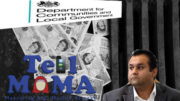If nothing else the collapse of the Silicon Valley Bank (SVB) has exposed to the world just how badly some companies are run and SVB appears to have been run very badly indeed. Whilst a change in economic circumstances may have contributed to the demise of this bank, mismanagement by those in charge of this bank do look to be a major part in why this bank has gone down the tubes, not just to the detriment of those who deposited vast sums of money in the bank, but to the security of the banking sector in general.
A good case in point is to look at how the SVB managed risk. With any financial institution, especially since the 2008 Banking Crisis, keeping a close eye on any risks that a bank may be facing and managing that risk is vitally important. I’m not a banker but even I can understand that a bank any bank, needs to make sure that they are not exposed to undue risk to their fiscal security. Therefore you need strong risk management leaders and teams. This is what SVB failed to put into place.
Instead of the hard nosed, honest, and capable individuals with the necessary strength of character to stand up for a bank’s customers, investors and shareholders in the face of possible management failings, SVB instead had a period of nine months where there was no proper risk management. SVB only appointed a replacement risk manager for the bank as a whole in January 2023. But it gets worse. According to a report in the Daily Mail, some of SVB’s risk management staff were not focussed on managing risk that the bank might be exposed to, instead at least one risk manager, the person in charge of the Europe region, appeared to be more interested in playing diversity politics and promoting diversity goals.
Although the recently appointed head of risk management for the bank’s US main office had not had enough time to make an impact, only being in post since January and probably can’t be blamed for the bank’s collapse, some of the activities of the other risk management staff does cause a raising of the eyebrow. The aforementioned Europe risk manager appeared it is claimed to be more interested in identity politics issues than what was going on in the bank or keeping a close enough eye on any risks that the bank faced.
The Daily Mail said on the subject of SVB’s European Chief Risk Officer:
Meanwhile, Jay Ersapah, who acts as CRO for the bank in Europe, Africa and the Middle East and who describes herself as a ‘queer person of color from a working-class background’ – organized a host of LGBTQ initiatives including a month-long Pride campaign and implemented ‘safe space’ catch-ups for staff.
In a corporate video published just nine months ago, she said she ‘could not be prouder’ to work for SVB serving ‘underrepresented entrepreneurs.’
Professional network Outstanding listed Ersapah as a top 100 LGTBQ Future Leader.
‘Jay is a leading figure for the bank’s awareness activities including being a panelist at the SVB’s Global Pride townhall to share her experiences as a lesbian of color, moderating SVB’s EMEA Pride townhall and was instrumental in initiating the organization’s first ever global “safe space catch-up”, supporting employees in sharing their experiences of coming out,’ her bio on the Outstanding website states.
It adds that she is ‘allies’ with gay rights charity Stonewall and had authored numerous articles to promote LGBTQ awareness.
These included ‘Lesbian Visibility Day and Trans Awareness week.’
Separately she was also praised in a Facebook post by the group ‘Diversity Role Models,’ a charity which campaigns against homophobic, biphobic and transphobic bullying in UK schools.
None of that is of any relevance to her real job which should have been to point out future risks to the bank or to highlight where the bank is likely to have problems. She seems to have been overly concerned with diversity issues when she should have been more concerned with what her employers were doing with regards their core bank management duties and pointing out where there might be future issues which might become a matter of concern.
However, according to the Daily Mail, those with their heads in the real world as opposed to those in the fantasy time wasting world of ‘diversity’ pointed out that there were structural problems with this bank such as having a board that is more concerned with ‘woke’ issues and less about running the bank properly.
The Mail added:
This weekend critics hit out as Ersapah’s apparent preoccupation with LGBTQ issues.
One Facebook user, Paul Tucker, wrote: ‘The [SVB] Board of Directors is filled with diversity hires who are there because of their woke credentials.
‘They all have pronouns in their bios, which are filled with corporate newspeak.
‘The Head of Financial Risk and Model Risk Management was this nutbag: Jay Ersapah.
‘This is what happens when you allow people to manage your money based on woke principles instead of on their actual skill and competence.
‘I hope the depositors at this failed bank enjoy all of that diversity, because diversity is your strength, eh?’
He signed off the post: ‘Get woke, go broke.’
Another Twitter user said: ‘Head of Financial Risk at SVB Jay Ersapah might’ve been busy with more important projects at the bank, such as LGBTQ issues, rather than assessing risk.’
From what these commentators are saying there does seem to be a lot of people more concerned about having their bollocks pronouns in their corporate biographies than showing that they were competent to do their jobs. In my view the primary purpose of a bank’s management should be to keep the bank solvent, not expose the bank to undue risk, protect the deposits of the investors and serve the interests of the investors and shareholders. Getting involved in a whole lot of diversity tossery should be of the very least priority.
As I said earlier, it’s not just the diversity nutbaggery that has created problems for SVB. They were affected by downturns in the Tech Industry, allegedly buying government bonds that lost value as soon as interest rates rose and a lot of the fiscal slack disappearing from the economy. However, it does make me wonder if being too focussed on diversity and other Environmental, Social and Governance (ESG) goals, has led them to take their eyes off of what is or should be of primary importance for any business, which is the bottom line.
A lot of people and companies will be losing an awful lot of money due not only to their decision to leave more money than is sensible with SVB or ‘Woke-bank Mountain’ as I believe they should be called, but also because they bought into the idea that ESG goals should be the priority rather than the ideas that the bank should make a profit and that depositors money should be as safe as it should be. There’s going to be a lot of nasty fall out and impact from the collapse of SVB, the big question now is will this impact be controlled and therefore only make a ripple in the finance pond or will it create a tsunami of seriously bad outcomes?





Why would they care – it wasn’t their money they were throwing down the drain.
What is the betting that all the woke nutbags who, I presume, lost their jobs in the collapse pop upa again in even more exalted positions elsewhere.
It isn’t only in the NHS that people fail upwards.
Indeed. It was a lot of other peoples money. Money from big media distribution players, one of whom had I believe $400 million deposited with SVB. There’s also money deposited by start ups and the venture capitalists that have funded them. As for where the wanky woke bankers of SVB will end up, then I would be completely unsurprised to see them with NHS jobs.
Seems to me to have echoes of the failure of the Co-op Bank here (who were praised immediately before for bringing in non-bankers to run things).
As a side note, interest rates have really only gone up in what, the last year or so. And that’s coming off the back of a decade of easy money, particularly in the tech sector that these guys were part of. With no knowledge of the details, how bad a state were they in that as soon as the winds changed they sank?
Well remembered about the near collapse of the Co-op Bank. I seem to recall that there were some quite ‘colourful’ characters involved in the bank at that time who took their eyes of the business ball. Such as this one: https://www.churchtimes.co.uk/articles/2013/29-november/books-arts/press/the-case-of-the-crystal-methodist
Good point there. Those running this bank might never have known bad times with high interest rates. The whole business environment that they swam through was built on cheap money. Why didn’t anybody in this bank pipe up and be the ‘memento mori’ and tell those making decisions that the low interest rates, cheap readily available funding and a growing tech sector period woudl not last forever?